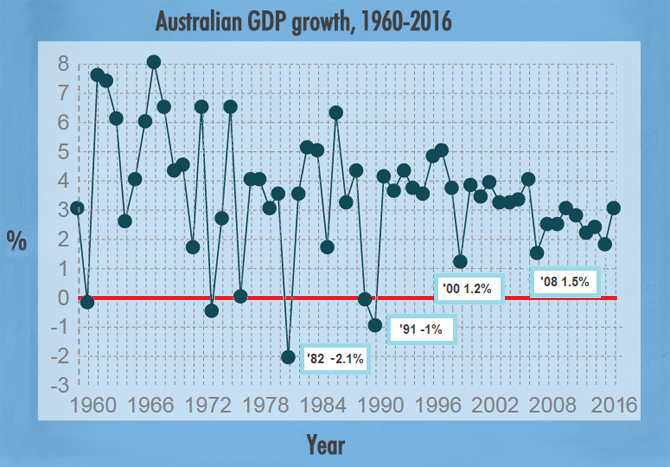-
Glenn Stevens retired from the Reserve bank of Australia in September, warning the country risks lulling itself into a false sense of security by constantly retelling the “25-years-without-a-recession” narrative.
As others have called out – we now have roughly two generations in Australia unscarred by a recession. But recessions are the economy’s bushfires. There will always be another, it’s just a matter of when, how we prepare, and how we respond.
" Australia now finds itself with a workforce inexperienced in managing negative economic growth."
Rob Molyneux, Group General Manager, Risk Metrics & Infrastructure, ANZNo one would point to Australia’s avoidance of the worst of the global financial crisis (GFC) as regrettable. But in one respect, a severer impact might have placed us in better stead for when (not if) the next recession hits.
{CF_IMAGE}
Australia experienced a recession roughly every decade from 1960 through to 1991 but we now sit at the top of a cycle having avoided negative growth for 25 years. Whatever the reasons, Australia now finds itself with a workforce inexperienced in managing negative economic growth.
To have experienced Australia’s last real recession and been active in the response (as opposed to in a very junior role), you’d need to have been in the workforce 30 to 35 years, making you at least 50 years old today. The average age of Australia’s workforce is 40.
If experience is partly what’s required to weather an economic storm, have we misplaced our umbrellas? Is there a risk we won’t adapt fast enough when the next recession hits given most of our working population haven’t experienced a recession in their working lives?
SURVIVAL
The human survival instinct is strong. In crisis we pull together to work our way through because it seems obvious what needs to be done. Save lives, feed and clothe. Think: Victorian bushfires, Queensland floods, Christchurch earthquake. Immediate events. Immediate actions.
The same goes during significant economic shocks; banks, industry and government are pretty good at pulling together and managing through very sudden events. The actions are clear when the threat is imminent.
Arguably our response to the GFC exemplifies Australia’s ability to respond to crisis. For the most part the defaulting of global banks and the halt in lending were dramatic and sudden events.
Granted, Australia wasn’t as detrimentally affected as the rest of the world, but it was an issue for the banking industry here and we managed through it by collaborating with government, central banks, regulators and businesses. The deposit guarantee and government bonus were examples of Australia’s prompt reaction.
SLOW BURN
The challenge is – usually – a recession creeps up on you, unlike a natural disaster. You don’t wake up one morning and see it out the window. So in that respect the suddenness of the GFC didn’t provide us with the experience of a ‘real’ recession.
In my 40 years in the banking industry I’ve actively experienced two quite different recessions, but what I’ve noticed is survival is based on the adaptability and nimbleness of the response.
A recession tends to burn slowly before it builds into a full blown, fiery bushfire. Even if we do notice the signs, the threat is not imminent like a flood or an earthquake. Therefore the nimbleness and agility of how government, people and industry respond is likely to be slower because the course of action is less obvious.
You could say the same about the way the world is responding to the threat of climate change.
GEN NEXT
A challenge with 25 years of positive growth is the accompanying improving lifestyle becomes the norm. It’s no wonder we talk about an entitlement culture. Entitlement becomes ‘business as usual’. For some, it’ll be a quite a challenge to limit the daily café coffees once budgeting and frugality become inevitable
To counter this, one could argue younger workers are more flexible in their expectations and approach to life, having been groomed to expect multiple career changes in their lifetimes and adapt to changing environments, including technology.
So while lacking actual experience they may tend to have a more flexible approach which could be advantageous in how we adapt and respond to a recession.
TO REGULATE OR NOT TO REGULATE
Interestingly, the world is entering an era of increased regulation, as businesses (including banks) attempt to deal with the challenges of cybercrime, bank failures, capital, higher consumer debt levels, stagflation and negative interest rates.
If the deregulated environment of the past decades has made us more agile and helped avoid recession for the past 25 years, will the re-regulation in the pipeline remove some of this nimbleness and place us at disadvantage? If so, that would be an unintended consequence.
Rob Molyneux, Group General Manager, Risk Metrics & Infrastructure, ANZ
The views and opinions expressed in this communication are those of the author and may not necessarily state or reflect those of ANZ.
-
anzcomau:Bluenotes/global-economy,anzcomau:Bluenotes/global-economy/economics
The next recession is inevitable
2016-10-05
/content/dam/anzcomau/bluenotes/images/articles/2016/October/molyneuxrecession_thumb.png
EDITOR'S PICKS
-
In the middle of the most volatile presidential election in a generation, the global gaze on the United States of America has rarely been so intense. Inevitably, this will affect the economy but what is going on behind the headlines and controversy?
15 September 2016

